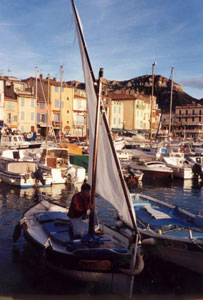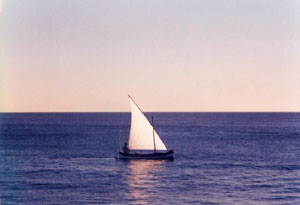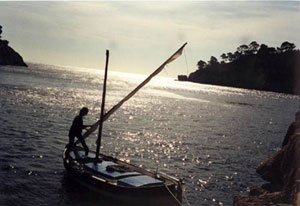|
The
Bay of Cassis
Dear
John,
 Here
we are in a little village on the Mediterranean, where I am working
for a few weeks with my friend Carlo Rovelli, who is a Professor
nearby in Marseille. Carlo and I discovered the main ideas that
went into loop quantum gravity working together in a setting like
this, in Verona, getting together each day to talk, and then going
home to calculate and check on our own, and it is wonderful to be
back working with him. We understand each other easily, and from
long experience know how to compensate for each other's strengths
and weaknesses and so we work quickly. We are making fast progress
on understanding the implications of the existence of a cosmological
constant for quantum gravity. I had taken a detour of a few years
to apply what we had learned about quantum spacetimes to string
theory, but there is so much about nature, not the least the apparent
fact that there is a cosmological constant, that string theory seems
not to incorporate. Now it is wonderful to be back in reality, four
dimensional and non-supersymmetric as it seems to be after all. Here
we are in a little village on the Mediterranean, where I am working
for a few weeks with my friend Carlo Rovelli, who is a Professor
nearby in Marseille. Carlo and I discovered the main ideas that
went into loop quantum gravity working together in a setting like
this, in Verona, getting together each day to talk, and then going
home to calculate and check on our own, and it is wonderful to be
back working with him. We understand each other easily, and from
long experience know how to compensate for each other's strengths
and weaknesses and so we work quickly. We are making fast progress
on understanding the implications of the existence of a cosmological
constant for quantum gravity. I had taken a detour of a few years
to apply what we had learned about quantum spacetimes to string
theory, but there is so much about nature, not the least the apparent
fact that there is a cosmological constant, that string theory seems
not to incorporate. Now it is wonderful to be back in reality, four
dimensional and non-supersymmetric as it seems to be after all.
From the patio where I work I have a view of the bay of Cassis and
the beautiful cliffs that rise to the east of it. Today there is
little wind on the bay and the sailboats hardly move. Yesterday
was windy and we took Carlo's boat out. He has bought an old wooden
boat, built a century ago in this harbour, five meters, open, symmetric
front to back, with gentle curves such as one sees in old paintings.
Working from drawings in 19th century books Carlo has restored it
to what might have been its original design, adding a mast, sail
and rigging of the style used in the Mediterranean from the middle
ages to the advent of modern, triangular sails. The sail hangs from
a pole, which in turn is hung by a complicated organization of ropes
from the top of the mast. Carlo has a lot of fun watching me try
to sail his boat. Downwind we do get some speed, but the boat will
hardly go upwind, and coming about takes practice. In such a boat
one understands why it took Ulysses so long to get home and one
wonders, watching the modern fiberglass sloops speeding by, whether
it was a matter of materials or imagination that it took more than
20 centuries for people to realize it's much better to attach the
sails directly to the mast.
Afterwards
we have a meal which, with the exception of the tomatoes and a bit
of chocolate, has been enjoyed in the Mediterranean since the advent
of agriculture: olives, cheese, bread, fish, a good local wine.
One cannot but think of Jared Diamond and wonder if it was really
the case that the small scale organization required to reach a high
standard of living on such food made possible small independent
city states and hence the Phoenicians, the Greeks, the Romans, the
notion of mathematical proof, the monotheistic religions, the idea
of democracy and hence so much of modern civilization.
 Before
this I was in London for a few days, catching up with old friends,
and working with Joao Maguiejo on our version of an idea that has
sprung up from a number of friends and colleagues in the last two
years: that perhaps special relativity is modified at very short
distances. The idea is that not only can the speed of light be a
constant, but one can have also an invariant length, that all observers
agree on, in spite of the fact that usually lengths contract in
relativity. The invariant length can be the Planck length, below
which loop quantum gravity predicts the geometry of space and time
is atomic and discrete. But what is really wonderful is that some
people, particularly Giovanni Amelino-Camelia, have realized that
such a theory has consequences that are experimentally testable
not in 500 years, but now. By observing light or cosmic rays which
have traveled for most of the history of the universe, one can detect
such modifications of relativity. The result is that it appears
possible to test experimentally which if any of the quantum theories
of gravity are correct. So physical theory will not be a matter
of sociology, as it has sometimes seemed over the last twenty-five
years when experiment played little role. Instead nature will let
us know if string theory, loop quantum gravity or something else,
is the right description of space and time at the shortest distances. Before
this I was in London for a few days, catching up with old friends,
and working with Joao Maguiejo on our version of an idea that has
sprung up from a number of friends and colleagues in the last two
years: that perhaps special relativity is modified at very short
distances. The idea is that not only can the speed of light be a
constant, but one can have also an invariant length, that all observers
agree on, in spite of the fact that usually lengths contract in
relativity. The invariant length can be the Planck length, below
which loop quantum gravity predicts the geometry of space and time
is atomic and discrete. But what is really wonderful is that some
people, particularly Giovanni Amelino-Camelia, have realized that
such a theory has consequences that are experimentally testable
not in 500 years, but now. By observing light or cosmic rays which
have traveled for most of the history of the universe, one can detect
such modifications of relativity. The result is that it appears
possible to test experimentally which if any of the quantum theories
of gravity are correct. So physical theory will not be a matter
of sociology, as it has sometimes seemed over the last twenty-five
years when experiment played little role. Instead nature will let
us know if string theory, loop quantum gravity or something else,
is the right description of space and time at the shortest distances.

For
me the Mediterranean has always been a good place to reflect on
where science is going, both the community as a whole and my own
work. Science, at least theoretical physics, is very social, and
it is good to get away from universities, conferences and research
groups, and remember that it is all about nature.
Lee
|

